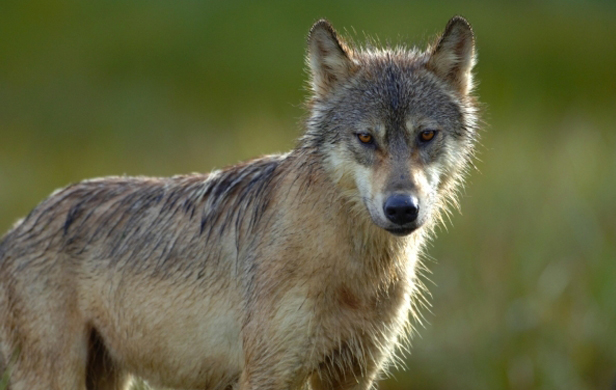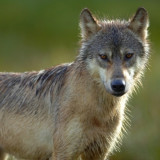
Let’s face it – the Wolf has had lousy public relations.
We all remember the story of Peter and the Wolf renowned in music and prose. I grew up to Walt Disney’s “Who’s afraid of the big bad wolf.” The big, bad wolf wanted to and actually did kill the Bambis of the forest. How bad is that?
Perhaps worse, whenever a positive thing is said about this sleek member of the dog family it’s often overdone, making him out to be a nice, family oriented, glamourous member of the furry creatures out there in the wilderness.
The truth is that the wolf is a highly intelligent beast living within an organized group which lives, as many of us do, on meat. It doesn’t have the convenient access to nicely packaged meat we do but must hunt its dinner and kill it. Nature is not always pretty.
In November 1979 I was made Environment Minister in Bill Bennett’s Social Credit government and the first thing I did was stop the government slaughtering wolves. In fact when I came into office, the debate was not whether or not wolves should be killed but how. In my briefing notes I read about the extent of toxicity a poisoned wolf would leave in the environment. Were
there “better” poisons? Should we trap and shoot them? Should we place a large bounty on them?
I decided “none of the above.”
The issue is once again a timely topic. According to a March 7 press release by
the Kootenay-based Valhalla Wilderness Society, referring to the looming
possibility of helicopter-based wolf hunting in BC’s Interior Wetbelt: “Sources wishing to remain anonymous have told the Valhalla Wilderness Society (VWS) that the BC government will make a decision very soon on whether to begin slaughtering wolves from helicopters. The use of helicopters is an escalation of the widespread slaughter of wolves and cougars that has been happening over the last three years under the excuse of saving mountain caribou.”
Decisions on annual wolf hunting in the region are made by a panel of environmental groups, set up by the provincial government, referred to as “The Progress Board.” The press release from Valhalla – not represented on the board – continued: “These organizations now have a big decision to make. Government has been using these groups’ endorsements to kill wolves and cougars for three years.”
Which is why it’s important to consider here for a moment the fate of this magnificent, yet terribly misunderstood wild creature – and the pros and cons of another potential wolf kill program this year.
In order to enter the debate one must know about the relationship between the wolf and the ungulate population – deer, moose, elk, caribou and the like. When man doesn’t get into the picture, nature works it this way: The wolf, when herds of ungulates get too large, reduces those herds until they are dangerously low thus the wolf begins to starve whereupon the herds of ungulates increase until they are overlarge and the process begins anew.
In 1979 the pressure to kill wolves came from the cattle ranchers which, since my riding was in ranch country (Kamloops) and much of my support came from ranchers, put me in a bit of a pickle, to say the least!
My decision was not popular with MLAs from ranching areas and one of them, Cyril Shelford and his seemingly never ending brothers, arranged for a huge protest in Smithers and invited me. In those days MLAs and Cabinet ministers were expected to attend such meetings no matter how unpleasant – and this one boded to be very unpleasant indeed.
When I was introduced to this hostile gathering of, so I was told, 500 ranchers, I
was roundly booed. I opened by saying that this was the only case in living memory
where someone was ridden into town on a rail. The best way to describe it is that I got loud abuse for two hours.
Two other groups were mad at me – hunters and guide outfitters who saw the wolf as competing for their prey, which they were.
I wanted to know more about the ranching argument so I sent an outdoors man, the late George Sandiford, with eyes and ears alert, around the province to seek out the truth. He came back and told me how at least three ranchers lost herds of cattle to wolves who had forced them onto frozen lakes where the ice was thin then ate the drowning cattle! A first year Law Student at his clumsiest could have shredded this case in two minutes. You have to ask why any rancher would still have his cattle on the range in the depths of winter.
That’s just what Sandiford wondered. He stated in his report that he believed wolves had killed some cattle, but nowhere near the numbers alleged. In fact he came away thinking that some ranchers wanted more to have the government pay for their losses, most of which were the result of bad husbandry.
Hunters and guide outfitters saw wolves as enemies of their lawful quarry. And they’re right.
This, I think, puts the matter into perspective – who has the greater right, man or beast?
We want it both ways – we want endangered species like the wolf and the grizzly bear to be supported and saved while ensuring that man can kill them whenever they become inconvenient and the price is right. The debate is usually couched in practical terms, discarding philosophical thoughts as being mush-headed crap from “condominium conservationists” who wouldn’t know a caribou from a cow.
Gordon Campbell’s agenda has no place for people who want to conserve because
they love their province for what it is, not what it will look like if
Campbell has his way. The logical conclusion of this debate is that those who
use the resource are the only ones equipped to make decisions, even though they have a conflict of interest you could drive a logging truck through. Such a conclusion ignores, as fish farmers have done so successfully, the Precautionary Principle which requires the user of the environment to demonstrate that it can be done without harm.
And there we have it – if you place the conservation of this province ahead of ripping it apart and selling it, you’re opinion is considered worthless. THIS MUST CHANGE – NOW!
I hold to this philosophy: Every living creature on earth has a right to be here. Whether that’s God’s rule or Charles Darwin’s theory there is a purpose to all life that amounts to interdependence. This surely means, at a minimum that man must adapt to his surroundings not the other way around. Left to their own devices, wolves and ungulates are in balance –
especially when excessive logging and other industrial impacts on our wild places
don’t cut down the habitat needed for both groups of animals (which is another
dimension of this issue in the Kootenays). When man steps in and kills the food of one species he diminishes the ranks of both. In the case of hunting, man depletes one food source – for wolves – which is replaced by cattle.
We must make a decision as a people before this rock-headed Campbell government sets us on a course of exterminating all wild life that gets in the way of government policy as funded by private interest groups; be they fish farmers, hunters, guides or, as in the case of Campbell projects, the South Fraser Perimeter Road and the consequent destruction of Burns Bog.
It’s all too easy for us, who don’t have time to deal with all the environmental outrages of this government, to pause only for a moment with the latest outrage, shrug the shoulders knowing it’s wrong, and conclude that nothing can be done.
But there is something to be done – and it can be done.
Forces to fight for our heritage are coming together so that we might fight together. Let me tell you what’s happening. It’s called Common Sense Canadian (which will officially be launched in a few weeks). This is not an umbrella group in the sense that other environmental organizations are subsumed by it. Far from it, the support of such groups has been enthusiastic because just like you the private citizen, they will have a place to tell their story. The contributors are the top people in their field. Through this conduit you will be able stay informed on these important issues and learn how you can get involved.


Is Premier Campbell and this provincial Government trying to emulate the actions of former (“drill, Baby, drill”) Alaskan Governor, Sarah Palin, who energetically pursued the policy of shooting wolves from helicopters? Overall this Government not only has an appalling record when it comes to protecting and conserving BC’s wonderful wildlife, it has shown appalling ignorance about the importance of all biodiversity and their interrelationships with humans. In this year of Biodiversity, the BC Government and its cohorts support the killing of wolves (& coyotes), the hunting of grizzlies, the elimination of old growth forests which support many species (including endangered), the “culling” of various ungulates, beavers, and Canadian geese, the support of horse slaughter yards, and, of course, sea-liced farm fishing. All the while crucial funding for environmental protection and conservation is severely reduced. Then Mr. Campbell and his puppet MLAs promote themselves as “pro-environment”. What total, farcical hypocrisy! It’s up to the public to save the wolves and BC’s remaining species. Assuredly the Government and politicians won’t!